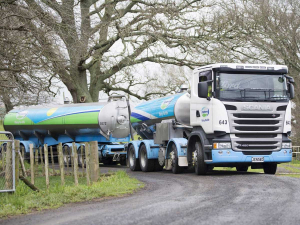Battle for milk
OPINION: Fonterra may be on the verge of selling its consumer business in New Zealand, but the co-operative is not keen on giving any ground to its competitors in the country.
 At last week's annual meeting, Fonterra chair Peter McBride revealed that any amount of any capital return would be determined by the divestment of assets as well as the co-op's financial position.
At last week's annual meeting, Fonterra chair Peter McBride revealed that any amount of any capital return would be determined by the divestment of assets as well as the co-op's financial position.
Fonterra is signalling to farmers that it may not meet its earlier pledge to return $1 billion to shareholders and unit holders within two years.
Speaking at Fonterra's annual meeting last week, chair Peter McBride revealed that any amount of any capital return will be determined by the successful divestment of assets, as well as the co-op's financial position at the time.
As part of its strategy to 2030, Fonterra set a goal of a return of about $1 billion to shareholders and unit holders from divestments, including Chilean business Soprole and a stake in the Australian business.
But after looking at options, Fonterra has decided to maintain full ownership of the Australian business.
Part of the 2030 strategy includes pumping $1 billion each into sustainability and moving milk into higher milk products.
McBride says the co-op is still committed to investment targets for sustainability, higher-value products and R&D.
However, he points out that return to shareholders and unit holders had anticipated divestments including Soprole and a stake in the Australian business.
"Even thoughwe have since decided not to sell a stake in our Australian business, we are still committed to targeting a significant capital return to our shareholders and unit holders.
"We need to be mindful that we retain the asset in Australia, and the earnings associated with it. The amount of any capital return will be determined by the successful completion of the divestment programme as well as the co-op's financial position at the time."
According to the latest Fresh Produce Trend Report from United Fresh, 2026 will be a year where fruit and vegetables are shaped by cost pressures, rapid digital adoption, and a renewed focus on wellbeing at home.
The Roar is a highlight of the game hunting calendar in New Zealand, with thousands of hunters set to head for the hills to hunt male stags during March and April.
OPINION: The past few weeks have been tough on farms across the North Island: floods and storms have caused damage and disruption to families and businesses.
European dairy giant Arla Foods celebrated its 25th anniversary as a cross-border, farmer-owned co-operative with a solid half-year result.
The sale of Fonterra’s global consumer and related businesses is expected to be completed within two months.
Fonterra is boosting its butter production capacity to meet growing demand.
OPINION: Fonterra may be on the verge of selling its consumer business in New Zealand, but the co-operative is not…
OPINION: What does the birth rate in China have to do with stock trading? Just ask a2 Milk Company.